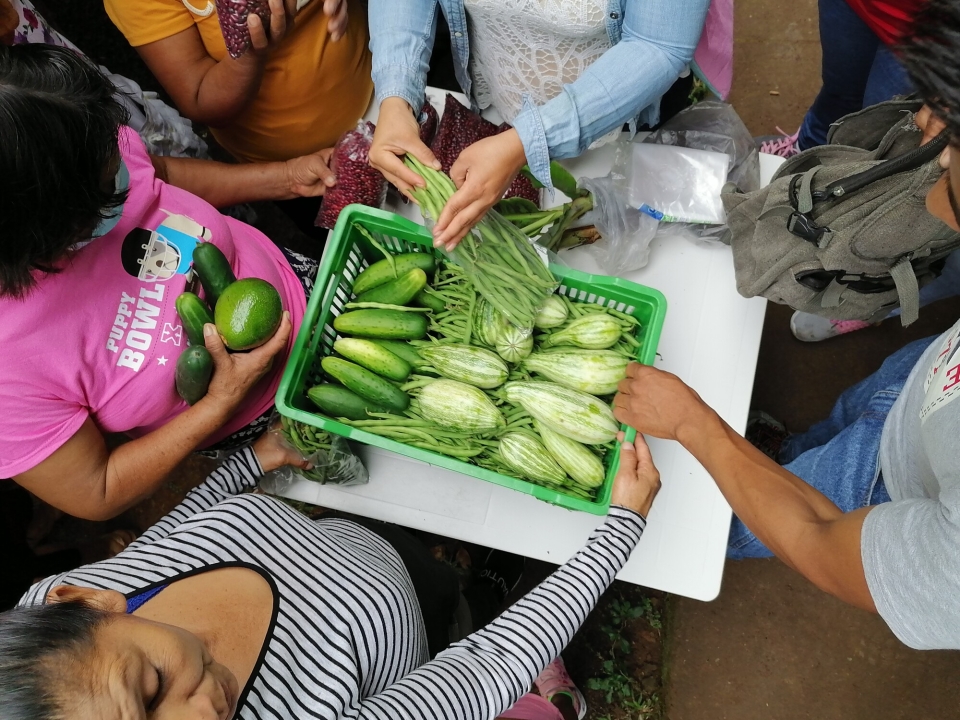Photo: Omar Ponce/AFSC
In the rural community of San Julián in western El Salvador, a group of women hike along the hillsides. They carry hoes, trays of seedlings, and sacks of natural fertilizer. Over several hours, they work the volcanic soil with their tools and bare hands—in the same way their ancestors did. With constant care, they know they will soon harvest fresh vegetables to nourish their families and communities.
San Julián is one of several communities where women and young people are leading sustainable agricultural projects, with support from AFSC.
In both El Salvador and Guatemala, AFSC works with local partner organizations to create opportunities for people to gather and learn from each other. Participants analyze how capitalism, colonialism, and patriarchy impact their lives—and share how their communities are organizing to protect their human rights. Participants also learn sustainable farming methods, receiving supplies and support to start projects of their own.
Their efforts come at a critical time. In El Salvador, communities are dealing with the impacts of transnational corporations that have exploited land and resources through commercial agriculture operations and the use of toxic chemicals. Some companies have privatized water resources, exacerbating El Salvador’s water crisis.
In Guatemala, communities also face struggles with foreign interests. Hydroelectric megaprojects have depleted natural resources, leading to environmental destruction and the displacement of communities.
Practicing sustainable agriculture is one way that communities are resisting. People are revitalizing ancestral farming practices. They are caring for their communities and the Earth. And they are building food sovereignty and a more just, local economy that works for all.
Here are some photos from a few of these efforts over the past year.
GUATEMALA
Nebaj, Quiché
Tomatoes are a key ingredient in traditional dishes in Guatemala. But in the highlands of the western part of the country, they’re extremely difficult to grow.
That has changed for the Ixil Mayan community of Nebaj, Quiché. Last year, AFSC helped community members build greenhouses to protect their crops from heavy rains and grow more produce. Since last year, families have been able to harvest plenty of tomatoes in Nebaj—as well as peppers and other vegetables.
The project is done in partnership with local organization Chemol Txumb’al (“Youth that weave knowledge” in the Ixil Mayan language).
The project provides women with opportunities for leadership in agriculture, which is traditionally led by men in Nebaj. Today six women are responsible for the greenhouses in their communities.
That includes community members like Jacinto Ceto, 25.
“I feel inspired to continue working in agriculture,” he says. “It connects me with my culture and that [is something] I want to pass on to my son.”
GUATEMALA
Chimaltenango
Last year, a group of Mayan Kaqchikel women in Chimaltenengo, Guatemala created a community garden of medicinal plants using ancestral farming practices.
The women are all members of AMEB (Association of Women Entrepreneurs Balanyá), a local partner of AFSC. They completed the project with their daughters and sons and with support from AFSC.
Today basil grows in the garden alongside rue, wormwood, insulin, thyme, peppermint, mugwort, and chamomile. Each has been used historically by the Mayan people for medicinal purposes. The community plans to dehydrate plants to make teas or infusions. These will be distributed through another upcoming project—the construction of a medicine bank.
Participants are working to recover the practices that their ancestors used for centuries to care for community members. They also want to restore faith in the use of medicinal plants.
The garden was spurred by concerns about the health of local families—and the lack of resources for health care. “We asked ourselves: How did our grandmothers treat these diseases,” says Lucía, a Kaqchikel Mayan woman and leader. “And it was there, in that space of exchange, that we retook the grandmothers’ and grandfathers’ advice, through the practices of caring for the land, choosing seeds, caring for the plants, and harvesting the crops.”

EL SALVADOR
San Julián and Cuisnahuat
The Agroecological School brings together women from 14 communities in western El Salvador. The region is home to most of the country’s Indigenous population.
Participants learn sustainable agricultural methods that are in keeping with their ancestral values. They learn how to conserve Native and Creole seeds. They also learn to identify transgenic seeds (ones that have non-native genetic material that can harm the ecosystem). And they learn to manage pests and disease through organic methods.
The school was founded by local partner ANADES (New Dawn Association of El Salvador) in 2017 and is now supported by AFSC.
Every year, participants harvest tons of healthy, organic vegetables—including green beans, green pepper, corn, and tomatoes. It’s more than enough to feed their families and neighbors and sell at local markets. In fact, ANADES and AFSC are looking for additional venues where women can sell what they’ve grown.
Sofia (pictured), age 15, is one of the youngest and newest participants in the program.
“I dream of having a healthy plot, taking care of our Mother Earth, taking care of our health, and also involving more young people in agroecology and being an example for them,” she says.